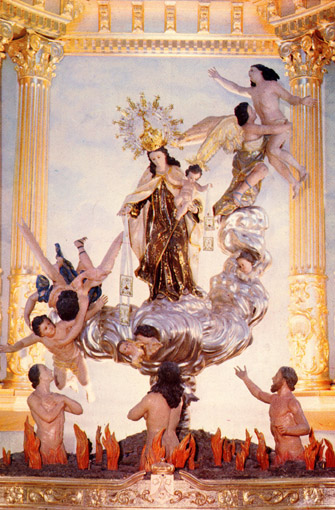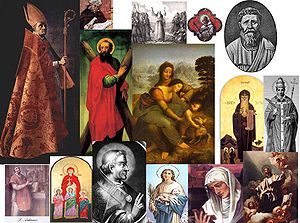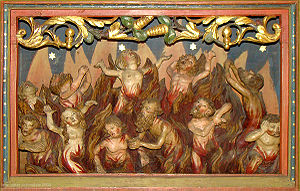There is a best selling book titled Heaven is for Real about a young child’s glimpse of Heaven. You may have heard of it since it was also made into a movie. But have you heard about the much darker prequel, Hell is for Real? Okay, it’s not really a prequel and it doesn’t go by that title. I’m talking about the first secret of Fatima when in 1917 Mary showed three Portuguese children a glimpse of Hell. Since November is dedicated to praying for souls, I want to focus on Heaven, Hell, and Purgatory and how the Fatima Prayer in the rosary is a great tool for praying for souls in need.

First, what is the Fatima Prayer?
While not part of the original tradition of the Rosary or in the original text of the vulgate, many Roman Catholics choose to add it after the Glory Be to the Father after the Blessed Virgin Mary was said to have requested its use during her apparition at Fátima, a miracle deemed “worthy of belief” by the Church. The following text of the prayer appears first in Latin and then in English.
- Domine Iesu, dimitte nobis debita nostra, libera nos ab igne inferiori, perduc in caelum omnes animas, praesertim eas, quae misericordiae tuae maxime indigent. Amen.
And now a flashback to my childhood. In my grade school I remember we had “rosary afternoons” in May where we broke up into small groups to pray the rosary. The groups were led by an eighth grader who explained how the rosary worked and led a group of seven other students, one from each grade 1st through 7th, through five decades. When I think back to those childhood rosary days I now recall one prayer being noticeably absent — the Fatima Prayer.
I think my early experience with the rosary was typical for a lot of kids. Someone thought it was best to shield us from the “scary prayer” that mentions the fires of Hell. I don’t believe this was done out of a disbelief of the reality of Hell, but more out of a concern of not opening that door of fear or questions from the inquisitive youth. I’m sure the school didn’t want to receive calls from angry parents about how their kid came home and said everyone is going to Hell or asked if Uncle Barney, who never went to church, was in Hell.
But the avoidance of talking about the afterlife, particularly Purgatory and Hell, didn’t end with the omission of the Fatima Prayer from my grade school’s rosary education. To this day, it’s a topic that most priests don’t touch with a ten foot pole. When was the last time you heard a homily about the eternal consequences of sin or the need to receive the Sacrament of Reconciliation? Over the decades, talking about sin and its consequences was unofficially deemed offensive speech. A priest cannot teach about sinful behavior without being labeled intolerant, self righteous, and uncompassionate. That is truly unfortunate because pretending that sin and Hell don’t exist does not make them any less real. Instead of explaining these scary aspects of reality and providing people with the knowledge, prayers, and the will to confront them, we sweep them under the rug. Instead of urging people to pray and help those “souls in most need of Thy mercy” we, as a Church in general, let people just dive into the fire because we’re afraid of offending someone.
Praying the rosary is a great way of meditating on the afterlife and praying for souls. Because talking about sin and Hell may be a taboo topic we have to put extra emphasis on them in our rosary intentions. After you pray each decade, that Fatima Prayer is that little reminder of Heaven, Hell, and even Purgatory (more on this in a bit). It encompasses asking for the intercession of the saints in Heaven, praying for at risk souls on earth, and those souls in Purgatory. Unfortunately, I too often race through the Fatima prayer. I treat it more like a placeholder while I think about my intentions for the upcoming decade. But slow down because there’s some heavy stuff in this prayer.
- “O my Jesus” — God sent his only son for our benefit. He wants us to have a personal relationship with him. You don’t say, “O Jesus.” That “my” is in there for a reason.
- “Forgive us our sins” — We all sin and are in need of reconciliation. There is nothing wrong acknowledging that we aren’t perfect and we screw up at times. We are asking for Jesus’ mercy for all peoples’ sins, hence the word “our” and not “my.”
- “Save us from the fires of Hell” — Again, we are asking Jesus for his mercy on all souls. The fact that this phrase comes after “forgive us our sins” highlights that connection between sin and Hell. We implicitly acknowledge that sin is the cause of going to Hell.
- “Lead all souls to Heaven” — This is where we want to go! Everything we do in life should be aimed towards one day living in God’s glory in Heaven.
- “Especially those in most need of Thy mercy” — There are many people on that edge of eternal damnation. But there is still hope for them. They need our prayers and the intercession of Mary, the saints, and the Holy Spirit.
Where does Purgatory factor into the Fatima Prayer? There is a bit of a mistranslation of this prayer from Portuguese into English according to Br. Alexis Bugnolo:
I would point out that this English translation is not exactly correct; because the Portuguese does not say “souls”, but “little souls”, a term of endearment among Portuguese Catholics for the souls in Purgatory, equivalent to our phrase “poor souls”. The the context of the phrase refers to the deliverance of all souls from purgatory into heaven; and thus never signified universal salvation.
Remember, souls in Purgatory rely on your prayers to get into Heaven. Imagine knowing that you are saved and you’re so close to entering God’s kingdom but there is nothing you can do unless people on earth pray for you. That frustration alone must be part of the purification process in Purgatory for your sins. But now you have a reason to remember those souls in Purgatory every time you pray the Fatima Prayer. Time to pray it forward because hopefully someday we all may be in a position where we will need those prayers.












